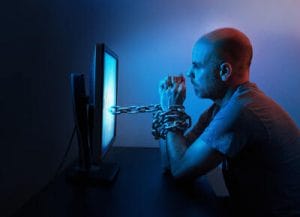Get Smart About Blue Light and Sleep
Light is essential in communicating with our brain the right time to be awake.
Exposure to light, particularly blue light from morning sunshine and electronics, sends a signal to wake. This also sets our circadian rhythm, dictating when we are meant to sleep.
Blue light suppresses melatonin. Melatonin is the hormone that makes us feel tired. So light stops a key process – feeling tired. Even if you are wearing an anti snoring device light is going to mess your sleep pattern.
Light in Evolution

Our bodies have evolved to live where the rising and setting of sun dictated the rhythms of life. Our ancestors knew it was time to get up when the sun rose, and that it was time to drift into sleep when the sun went down. It is light that sets our circadian rhythm.
Evolutionarily speaking, only in the last century has electricity been harnessed for artificial light – so we have light after sunset. Even more recently, we have screens that expose us to bright blue light – that for thousands of years, humans were exposed to only in the morning.
When we are exposed to light, we are telling our brain to suppress melatonin production (what makes us sleepy). It also sends cortisol (healthy stress) to give us the energy to get through the day. Research shows that it’s not only blue light that affects our melatonin production. Exposure to room light before bedtime alters the timing, duration, and amount of melatonin released, thereby making it harder to fall asleep.
How most people live today is opposite to what our bodies are designed for. Most people wake up and the sunlight they are exposed to in the morning is filtered.
With sunglasses, minimal light touches our retinas (communicating with our master circadian clock control).
People go into offices with artificial light and low exposure to natural light. When people go home, they put on the television or look at laptop or phone screens, which have strong blue-light rays that mimic the morning sunlight.
So how people are interacting with light is putting their bodies into a perpetual state of jet lag. The light is telling their body to be awake at night and asleep during the day.
Most Americans use electronics within an hour before bed, at least a few nights per week. The research shows that if you read a book on a light-emitting device before bed (such as an iPad), compared to lamplight, you’ll have a much harder time falling asleep. The blue light will suppress your brains natural release of melatonin by about 50%.
So without it being aware of it, people are putting their circadian rhythm out of sync with the day and night 24-hour cycle. No wonder collectively we are more sleep-deprived and caffeinated than ever.
Want to improve your sleep? Rethink your relationship to light.
- Ideally get some sunshine, early in the morning, around 10 minutes without sunglasses.
- Stay away from screens 2-3 hours before bed
Or if you have to look at screens, consider:
- Blue-light blocking glasses
- Install software on your laptop that reduces blue light (such as Flux)
- Make sure your smartphone has ‘night mode’ activated
- Use a dim light at night

